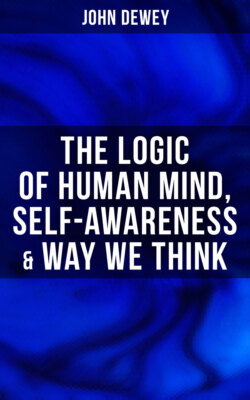The Logic of Human Mind, Self-Awareness & Way We Think

Реклама. ООО «ЛитРес», ИНН: 7719571260.
Оглавление
Джон Дьюи. The Logic of Human Mind, Self-Awareness & Way We Think
The Logic of Human Mind, Self-Awareness & Way We Think
Reading suggestions
Table of Contents
Psychology and Social Practice1
I
II
Psychological Doctrine and Philosophical Teaching
Psychology as Philosophic Method
II
Notes
The New Psychology
How We Think
Preface
Part One: The Problem of Training Thought
Chapter One. What is Thought?
Chapter Two. The Need for Training Thought
Chapter Three. Natural Resources in the Training of Thought
Chapter Four. School Conditions and the Training of Thought
Chapter Five. The Means and End of Mental Training: The Psychological and the Logical
Part Two: Logical Considerations
Chapter Six. The Analysis of a Complete Act of Thought
Chapter Seven. Systematic Inference: Induction and Deduction
Chapter Eight. Judgment: The Interpretation of Facts
Chapter Nine. Meaning: Or Conceptions and Understanding
Chapter Ten. Concrete and Abstract Thinking
Chapter Eleven. Empirical and Scientific Thinking
Part Three: The Training of Thought
Chapter Twelve. Activity and the Training of Thought
Chapter Thirteen. Language and the Training of Thought
Chapter Fourteen. Observation and Information in the Training of Mind
Chapter Fifteen. The Recitation and the Training of Thought
Chapter Sixteen. Some General Conclusions
FOOTNOTES:
The Reflex Arc Concept in Psychology
Endnotes
The Psychology of Effort
Notes
Creative Intelligence: Essays in the Pragmatic Attitude et al
Refatory Note
The Need for a Recovery of Philosophy. John Dewey
I
II
III
IV
V
Reformation of Logic. Addison W. Moore
I
II
III
IV
Intelligence and Mathematics. Harold Chapman Brown
I. Beginnings of Arithmetic and Geometry
II. The Progress of Self-conscious Theory
III. Contemporary Thought in Arithmetic and Geometry
IV. Things, Relations, and Quantities
V. The Function of Theory in Science
VI. Mathematical Intelligence
Scientific Method and Individual Thinker. George H. Mead
Consciousness and Psychology. Boyd H. Bode
I
II
III
IV
The Phases of the Economic Interest. Henry Waldgrave Stuart
I
II
CONCLUSION
The Moral Life and the Construction of Values and Standards64. James Hayden Tufts
I
II
III
IV
Value and Existence in Philosophy, Art, and Religion. Horace M. Kallen
II
III
IV
V
VI
VII
FOOTNOTES:
The Ego as Cause
Footnotes
The Terms 'Conscious' and 'Consciousness'
On Some Current Conceptions of the term 'Self'
II
Notes
The Psychological Standpoint
I
II
III
The Theory of Emotion: Emotional Attitudes & the Significance of Emotions
Emotional Attitudes
Endnotes
The Significance of Emotions
Endnotes
The Psychology of Infant Language
Notes
Knowledge and Speech Reaction
Notes
Human Nature and Conduct: An Introduction to Social Psychology
Preface
Introduction
Part One. The Place of Habit in Conduct
I
II
III
IV
V
VI
Part Two. The Place of Impulse in Conduct
I
II
III
IV
V
VI
VII
Part Three. The Place of Intelligence in Conduct
I
II
III
IV
V
VI
VII
VIII
IX
Part Four. Conclusion
I
II
III
IV
FOOTNOTES:
Отрывок из книги
John Dewey
Published by
.....
7. "Psychology and Philosophy," Mind, Vol. viii, 20.
Demand for the solution of a perplexity is the steadying and guiding factor in the entire process of reflection. Where there is no question of a problem to be solved or a difficulty to be surmounted, the course of suggestions flows on at random; we have the first type of thought described. If the stream of suggestions is controlled simply by their emotional congruity, their fitting agreeably into a single picture or story, we have the second type. But a question to be answered, an ambiguity to be resolved, sets up an end and holds the current of ideas to a definite channel. Every suggested conclusion is tested by its reference to this regulating end, by its pertinence to the problem in hand. This need of straightening out a perplexity also controls the kind of inquiry undertaken. A traveler whose end is the most beautiful path will look for other considerations and will test suggestions occurring to him on another principle than if he wishes to discover the way to a given city. The problem fixes the end of thought and the end controls the process of thinking.
.....